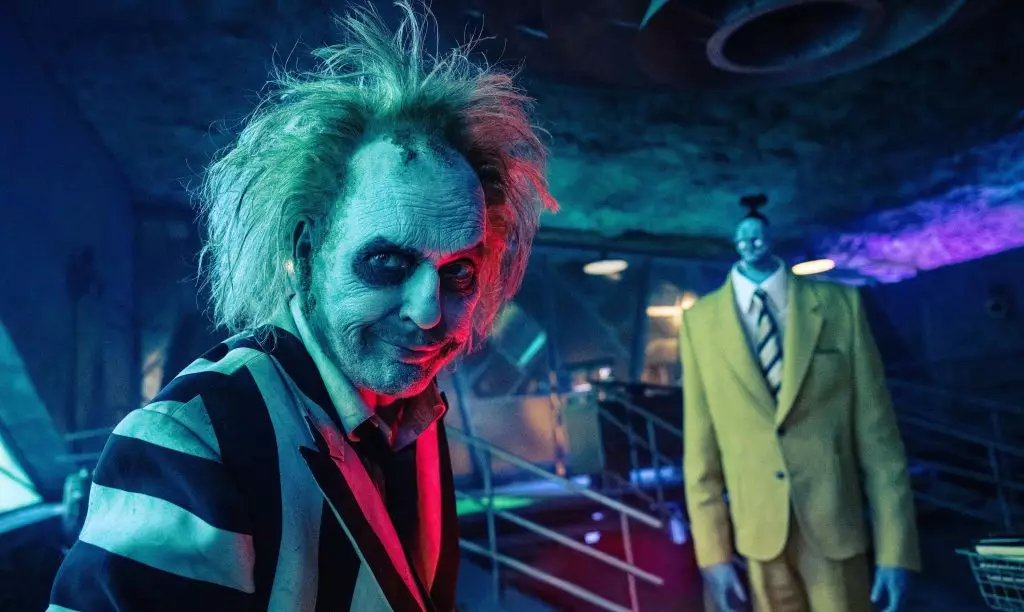In a remarkable display of cinematic resilience, the Tim Burton-directed sequel, Beetlejuice Beetlejuice, has persistently captivated audiences, even in the face of Hurricane Francine’s disruptive forces in Louisiana. As the storm weakens and transitions into a tropical storm, causing temporary closures of around 20 theaters from New Orleans to Baton Rouge, the film is projected to experience a slight drop in its earnings yet is still expected to dominate the box office landscape. This cinematic endeavor is estimated to gross around $44 million, marking a significant achievement as it approaches its second weekend. If accurate, that figure positions it as the second highest September weekend performance following New Line’s record-setting film, It, which grossed $60.1 million in its second weekend.
This performance underscores the film’s strong hold on audiences, showcasing its appeal even against adverse weather conditions. With a cumulative total approaching $126.1 million domestically, Beetlejuice Beetlejuice is solidly placed in the ranks of Tim Burton’s most successful films, trailing only Alice in Wonderland and Batman in terms of gross income. For studios, these figures illustrate the potential financial viability of films in an industry often at the mercy of unpredictable factors like natural disasters.
Beetlejuice Beetlejuice’s success can also be attributed to positive critical reception. The film scored a noteworthy $9 million on Tuesday, landing just behind the $11.4 million earned by It in 2017 for the best Tuesday in September. As critics rave about the film’s unique blend of humor and horror, audience interest seems to remain solid. This positive feedback is essential for any film’s longevity at the box office, indicating that word of mouth could bolster its earnings further.
Despite being 12% behind the pacing of It, which ultimately earned over $327 million, Beetlejuice Beetlejuice’s performance reflects strong franchise loyalty. Fans of the original film from 1988 have eagerly anticipated this sequel, and the ensemble cast, featuring notable actors like Michael Keaton, Jenna Ortega, Winona Ryder, and Catherine O’Hara, contributes significantly to the film’s allure. Familiar faces combined with Burton’s trademark stylistic brilliance forge a connection with audiences, ensuring a dedicated viewer base that could drive repeat attendance.
While Beetlejuice Beetlejuice carries the flag for Warner Bros., it faces formidable competition from other recent theatrical releases. Notably, Blumhouse Productions’ Speak No Evil, with a budget of $15 million, presents an intriguing alternative for horror aficionados. Set to open in over 3,200 locations, this film, starring James McAvoy, offers a different flavor of anxiety-driven storytelling centered around an American couple who encounter dark and unsettling circumstances during their stay with an eccentric family. The film has generated positive reviews, currently boasting an impressive 89% fresh rating on the critical aggregation site Rotten Tomatoes.
Moreover, Lionsgate’s The Killer’s Game, featuring Dave Bautista, brings a blend of action and comedy to the screen. Despite lukewarm expectations—projected to earn around $5 million—its word-of-mouth momentum could lead to an unexpected performance, highlighting the unpredictability inherent in the cinematic landscape. As various genres vie for viewers’ attention, the upcoming weeks will certainly be interesting for box office analysts and fans alike.
In addition to these mainstream releases, films like My Old Ass, which made waves during its Sundance acquisition and is directed by Megan Park, demonstrate the growing appetite for diverse narratives in theaters. With a strong approval rating and a limited but strategic launch across major U.S. cities, it reflects an industry increasingly willing to explore various types of storytelling.
This burgeoning landscape echoes a broader trend, revealing audiences are seeking deeper and more varied cinematic experiences. Films that push boundaries and provoke thought—like the upcoming political documentary Am I Racist?—further signify that the box office is not merely a battleground for tentpole franchises but a diverse ecosystem rich in potential narratives.
As Hurricane Francine approaches its exit from the limelight, the resilience demonstrated by Beetlejuice Beetlejuice and its contemporaries shines a light on the enduring spirit of film. Regardless of external circumstances, audiences will always seek a well-crafted story that resonates with their emotions and experiences, proving that cinema, much like nature, has an inherent ability to adapt and thrive.

